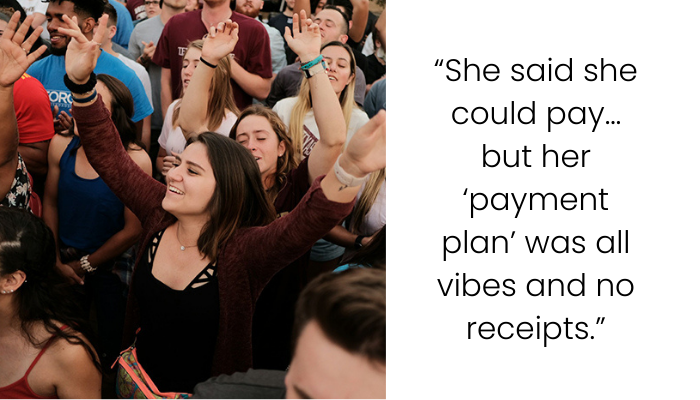AITA for Selling My Friend’s Concert Ticket When She Couldn’t Pay Me Back?
It sucks when money gets in the middle of friendship — especially when it’s tied to something fun, like going to a concert together. In this case, OP bought four Ariana Grande tickets for herself and three friends, under the agreement that everyone would pay their share. While two friends held up their end, the third, a close best friend, didn’t — or at least, couldn’t give any solid plan for when or how she would.
Even after multiple chances, and a flexible $20/month offer, she kept stalling. So when someone else offered to buy the ticket — someone who had the cash and really wanted to go — OP sold it. Now her friend’s upset, confused, and accusing her of being unfair.
The whole situation is emotionally messy. Friendships, expectations, and finances rarely mix well. Let’s dig deeper into this scenario and talk about emotional obligations vs. financial boundaries — and what OP (and others in similar situations) can do next.
A woman bought her friend group tickets to see Ariana Grande next year

But one friend kept making excuses and wouldn’t pay her back
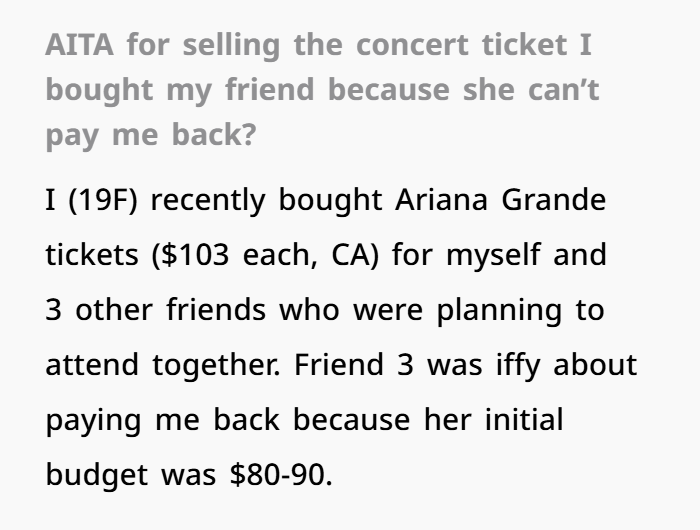
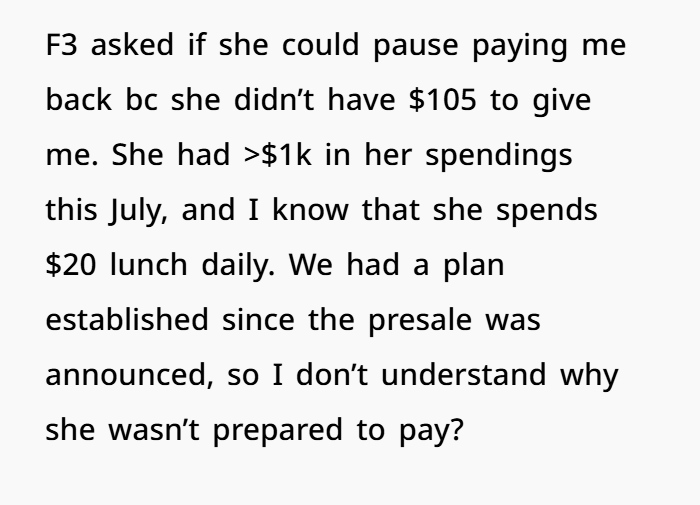
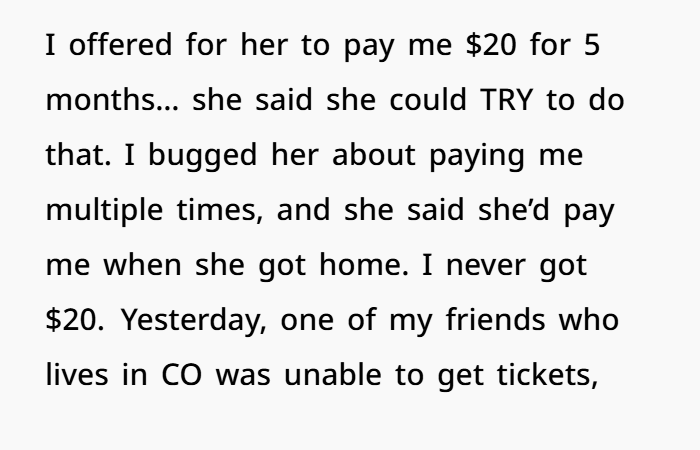
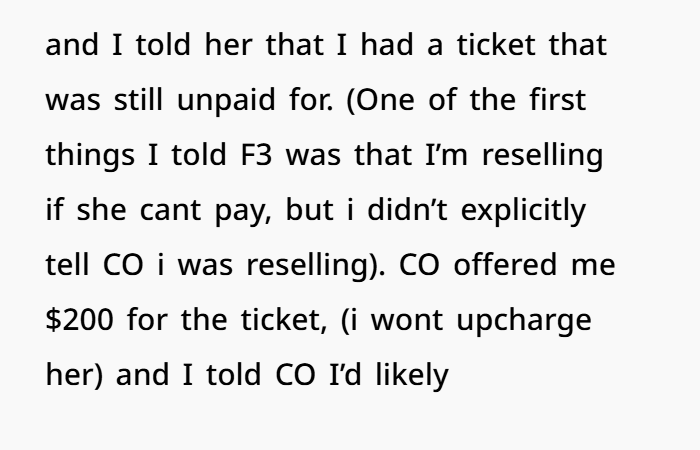
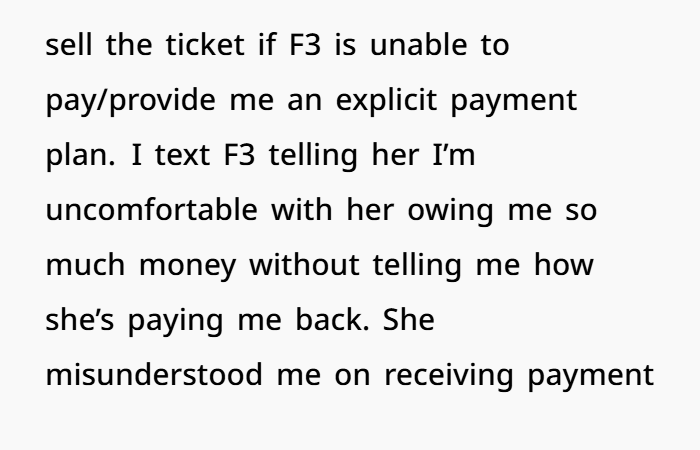
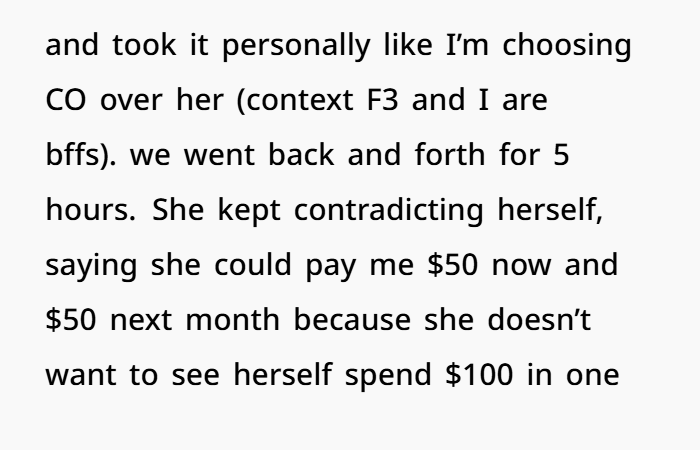
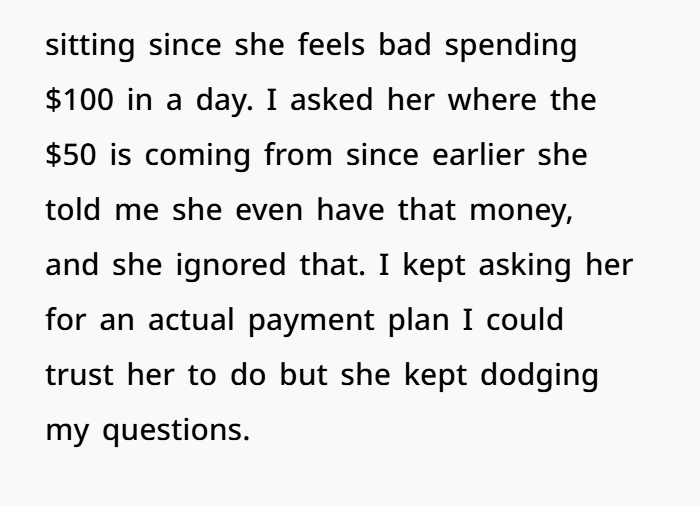
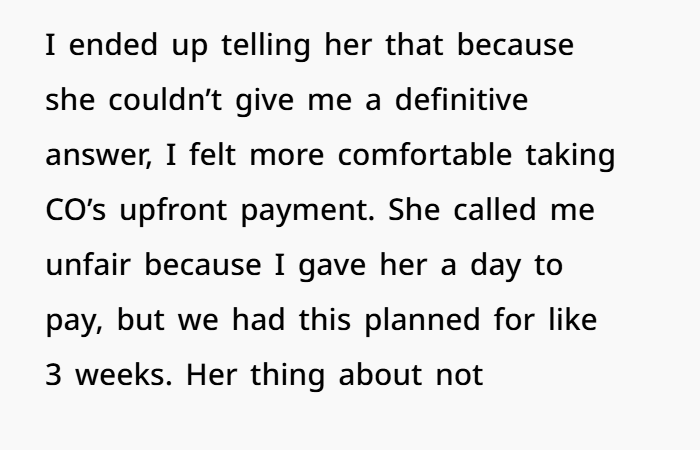
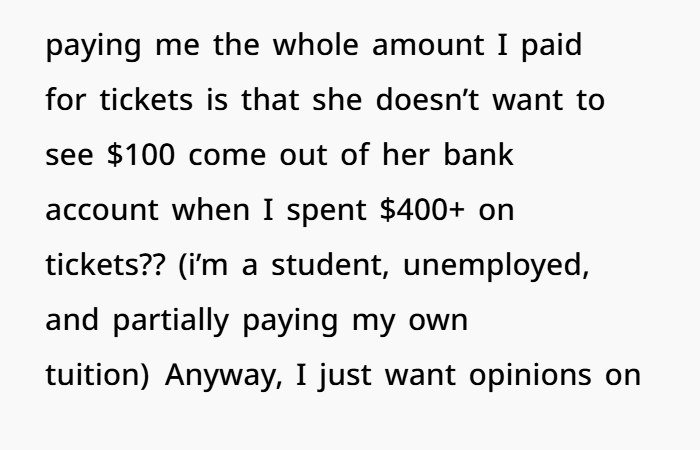
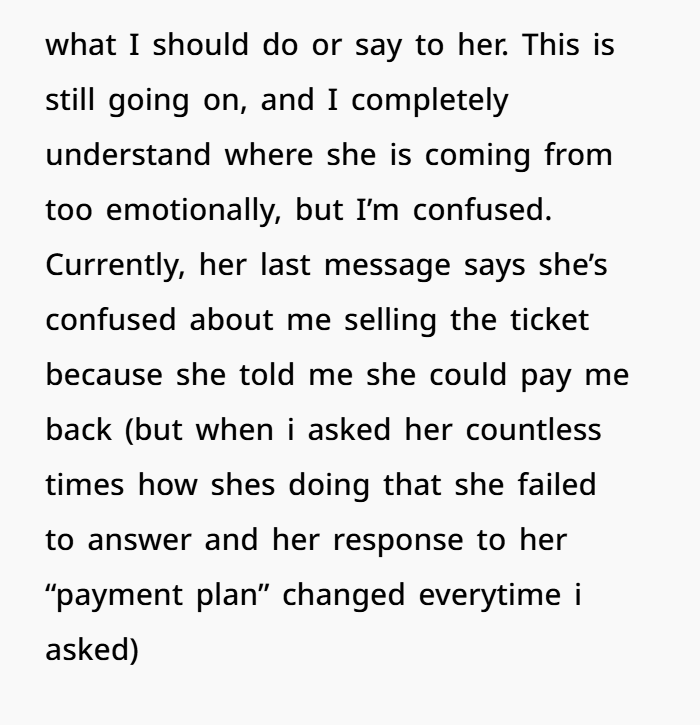
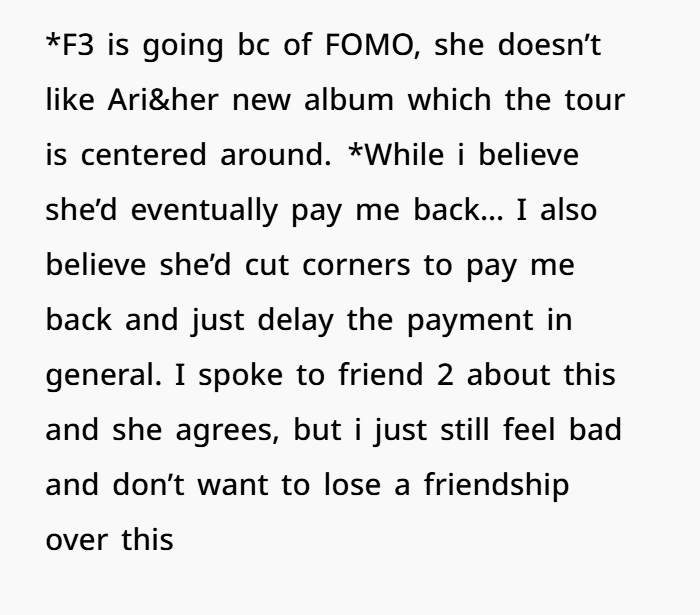
First off, no — you are not the a-hole for expecting to be paid back for a $100+ ticket. Especially when you fronted it without any promise of being reimbursed immediately and you’re a student, partially paying tuition, and unemployed. You gave your friend multiple outs, a super generous payment plan, and even a final heads-up. You didn’t surprise-sell it behind her back. But let’s walk through the why and how of all this, because these situations aren’t just about money — they’re about boundaries, communication, and respect.
1. Financial Boundaries Are Still Boundaries
People often talk about boundaries in emotional or physical contexts. But money boundaries? They’re just as real.
You weren’t trying to profit off your friend. You were literally just trying to not eat the cost of a ticket you bought in good faith. That’s not selfish — that’s survival, especially as a student.
You also clearly communicated upfront that you needed payment or a plan. You even warned her that you’d be selling the ticket if she couldn’t come through. That’s actually mature. You didn’t ghost her. You didn’t pull a shady move. You gave her multiple reminders and chances.
She failed to meet those — not because she couldn’t, but because she wouldn’t make a clear commitment.
2. “I’ll pay you eventually” is not a payment plan
Let’s be real: “I can TRY to pay you $20/month” is not a plan. That’s a soft maybe. Especially when she spent over $1,000 in the same month — including on things like daily $20 lunches — that’s not a person who can’t pay. That’s someone who doesn’t want to prioritize paying.
Saying she “feels bad spending $100 at once” is not a valid reason to delay repayment. You already spent $400 upfront. You felt bad too — probably a lot worse.
And you still offered flexibility.
She made it about emotion, when the truth is: it’s not about whether she wants to spend $100. It’s about the fact that she made a commitment, and then stalled when it came time to fulfill it.
3. The FOMO Friend Dynamic
Now, let’s talk about the elephant in the room: your friend doesn’t even like Ariana Grande’s new music.
She’s not going because she’s a huge fan — she’s going because she doesn’t want to miss out.

That’s a key part of the emotional confusion. She’s mad at you not just because of the money — she’s mad because she feels left out. FOMO is real, and it hits harder when someone feels like they should’ve been included no matter what.
But you weren’t the one who excluded her. Her indecision and refusal to lock in a plan did.
Sometimes, people in friend groups feel like they’re owed participation just because of the friendship history. But that’s not how real life works. Concerts have price tags. Events have deadlines. If she didn’t hold up her part of the deal, she can’t claim ownership of a ticket that was never hers until paid for.
4. Choosing Logic Doesn’t Mean You’re Choosing a Side
She’s hurt. You get that. That’s why this is so hard. But her taking this personally — as if you “chose” CO friend over her — is misplaced.
You didn’t “pick” someone else. You picked peace of mind. You picked a financially responsible choice. That’s not betrayal. That’s just being an adult.
Her response (five hours of texting, avoiding clear answers, getting emotional) shows that she was hoping you’d cave. But healthy friendships include respect for each other’s time, money, and emotional energy. She may feel upset, but that doesn’t mean you did something wrong.
5. What Should You Do Now?
Now you’re stuck in the “I don’t want to lose a friend” zone. And that’s hard. Especially when this friend is someone you clearly care about. But here’s the truth:
Sometimes friendships end not because someone was wrong — but because one person refused to take responsibility.
Here’s what you can do to soften the landing while still holding your ground:
✅ Text her one last time with clarity:
Something like:
“I get that you’re upset and feel hurt — and that’s valid. But I needed a clear plan and payment for the ticket, and after multiple conversations, I still didn’t have that. I didn’t want to make this about money, but I also couldn’t keep chasing you for something I paid for weeks ago. It’s not about choosing someone over you — it’s about doing what made sense when no solution was given. I still value our friendship and I’m open to talking when things have calmed down.”
✅ Give her space
She may need time to cool off, especially if her pride or ego is hurt. Let her sit with her feelings. If she values the friendship too, she’ll reach out.
✅ Don’t chase or over-apologize
You didn’t scam her. You didn’t lie. You didn’t upcharge her. You tried every way possible to accommodate her. You are not obligated to feel guilty for making a decision based on what’s fair.
✅ Reflect, not regret
If this ends your friendship, that sucks. But what sucks worse? Continuing to feel responsible for someone else’s poor planning. That would only lead to resentment down the line.
And it’s not like the friend was broke: “She doesn’t drive, doesn’t have a job, and her parents pay for her expenses”
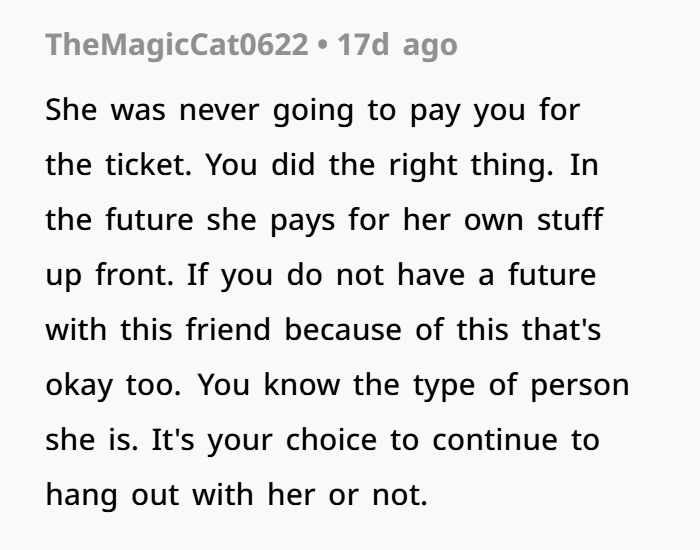
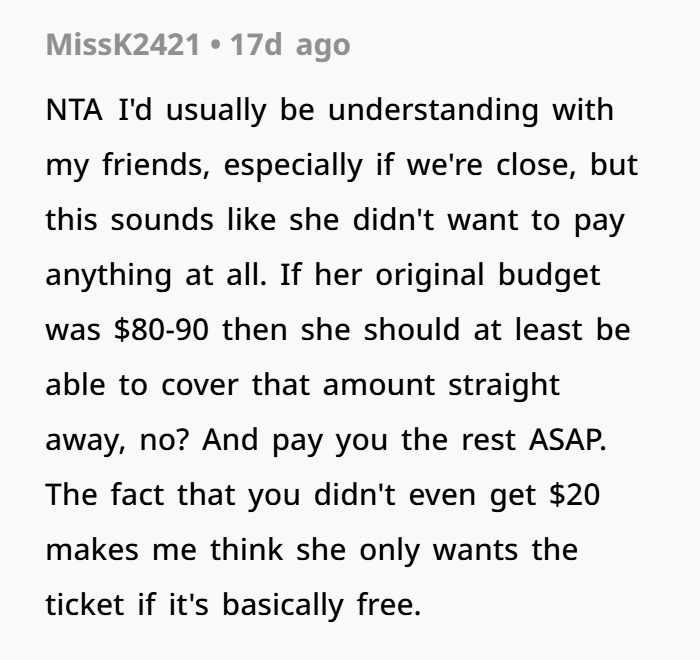
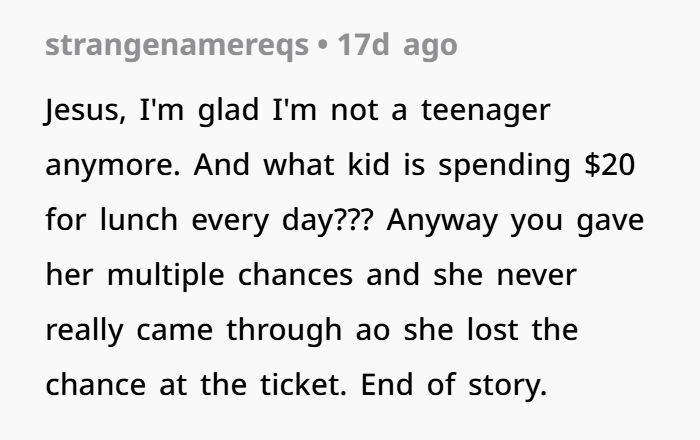
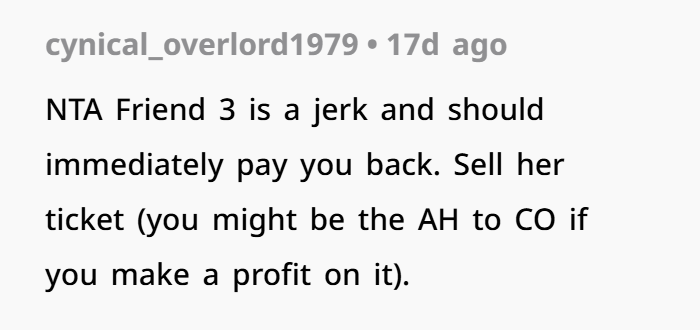
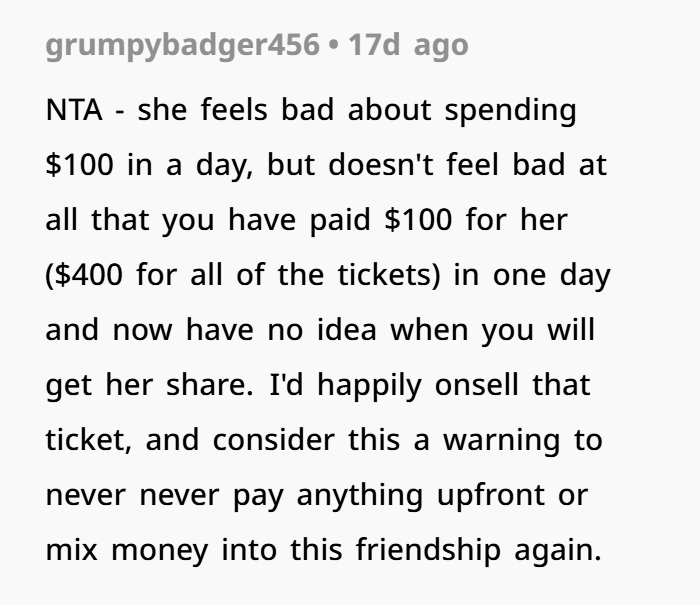
You gave her opportunities. You communicated clearly. You were generous. She didn’t respect the timeline or urgency, and then made it about emotion rather than responsibility. That’s not on you.
Money can reveal things about friendships — not because the money is the problem, but because it highlights how people handle accountability, pressure, and mutual respect.
If she values your friendship long-term, she’ll come back when she’s ready to see things more clearly.
And if she doesn’t — then this might’ve saved you from deeper issues down the road.
Still feeling unsure? I can help you draft a short message to her that keeps your boundary firm without burning the bridge. Just let me know.

